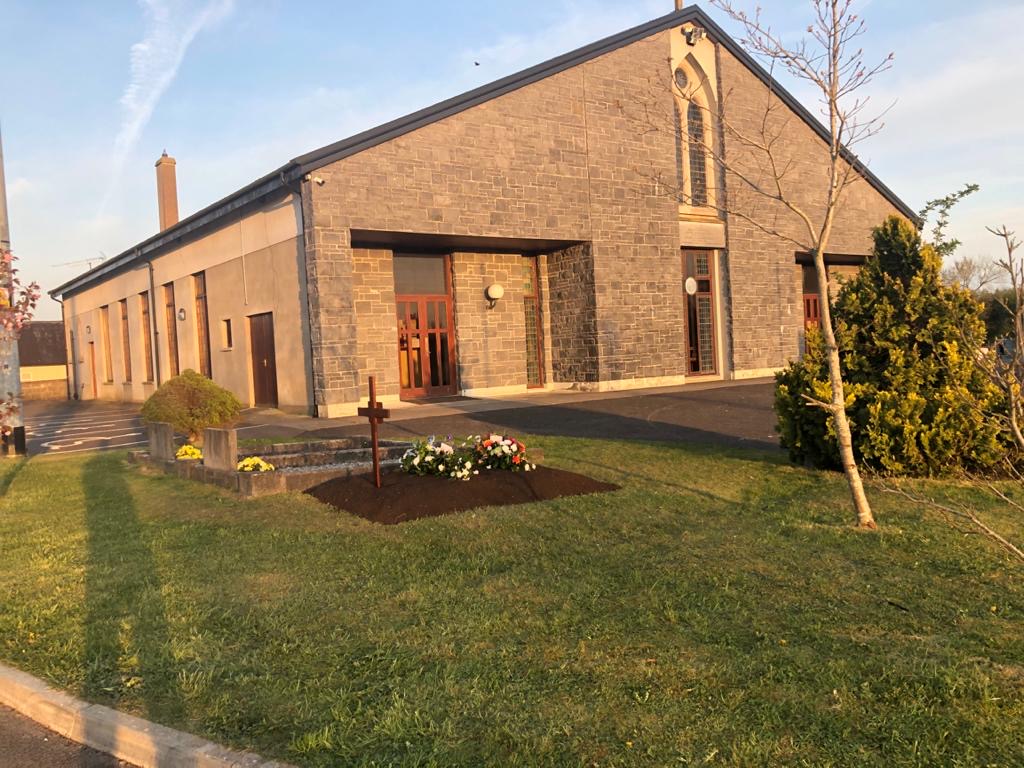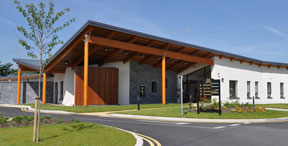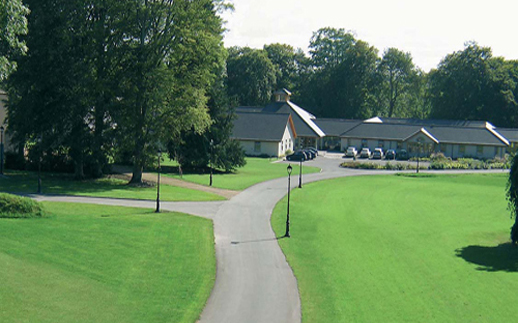By: Michael O’Farrell – Investigations Editor.
THEY buried him on Thursday afternoon directly outside the front door of the parish church he’d served for decades.
Ever since, members of the rural Bohermeen parish in Co. Meath have been drifting by one by one to pay their respects at the graveside of Fr Patrick Alphonsus Mackin.
Fr Phonsie – as everyone called him – was the latest around here to have been ‘taken by the Covid’.
Aged 91, he died seven kilometres away in Navan’s Millbury Nursing Home on Monday.
Not long ago there were 66 residents at Millbury.
In recent weeks seven have died from Covid-19.
Two other confirmed cases are still being cared for at the nursing home while 10 patients are awaiting test results.
From within a locked-down Millbury, the surviving residents watched Fr Phonsie’s funeral online as the Bishop of Meath, Tom Deenihan, addressed an all but empty church.
‘There is something profoundly sad,’ he said. ‘We are reduced to this small crowd – barely 10 people that we have here in the church.
‘But the mercy of God doesn’t depend on crowds,’ he consoled.
What needs crowds is the virus – and it found them in vulnerable settings such as nursing homes as the health system geared up for a crisis at acute hospital level.
Fr Mackin knew he had Covid-19 and when he was diagnosed he – like many virus patients at Millbury – chose to remain at the nursing home.
It was his home and he was happy to die there.
Owner Lucy Grillet is proud of that. Together with her husband Thierry, she also owns another facility – the St Elizabeth Nursing Home in Athboy.
So far St Elizabeth’s is Covidfree.

But Millbury wasn’t so lucky. The first two cases were diagnosed three weeks ago. Soon afterwards families of residents received the letter they all feared might come.
‘We regret to inform you that we have had two Millbury residents test positive in the hospital for Covid-19,’ it read.
But Mrs Grillet and her team were ready – as ready as they could ever be.
The home had plans in place and had stocked up with its own PPE. A former nurse herself, Mrs Grillet knew what she was facing.
What surprised and worried her was the lack of the HSE’s testing ability – something she quickly encountered.
Every day a public health official from the HSE calls for an update on cases and deaths in each affected nursing home.
During the first calls, weeks ago, Mrs Grillet asked about blanket testing for staff and residents.
How else, she thought, could she protect those for whom she was responsible?
‘I asked would the department consider doing blanket testing and the answer at the time was that it was too early.’
This weekend, the HSE is gearing up for a testing blitz of all nursing homes.
But for many in places like Millbury it’s too late.
‘Now we know it would have been very beneficial,’ said Mrs Grillet.
‘I don’t think we would have been in the situation that many nursing homes find ourselves in today if we’d had it.’
Aside from those who died, Mrs Grillet lost 15% of her 90 staff to enforced isolation. She has hardly slept in 25 days and there were times she wasn’t sure how she’d keep going.
‘For sure this has been the biggest challenge that I have ever had to deal with in my life,’ she admitted. ‘It’s heartbreaking as an owner and a nurse and as someone who cares for my residents. There are no words to describe it.
‘Certainly, there were days when I was at my wits’ end. It’s the worry. It was the stress. It was the fear of the unknown and who to turn to if this was going to take a turn for the worse.’

Other Meath nursing homes suffered the same perfect storm – and like Millbury are now coming out the other end.
Just 25 minutes away – beside an empty and padlocked Tayto Park – Kilbrew Nursing Home has now seen its Covid-19 deaths run into double figures.
‘Our outbreak is basically over,’ chief executive James Keeling told the MoS.
‘We might lose one or two more but at the moment there are no outward signs of that.’
Mr Keeling, who does not want to disclose precise death figures just yet, believes that in the absence of blanket testing his facility never stood a chance – even though, like Millbury, it is run in an exemplary fashion.
‘This thing is so transmissible that once it’s in – it spreads very quickly.’ he said.
‘I would expect that everyone in the building was exposed and it would look at this stage that those who were going to pass away from it have done so.’
FOR Kilbrew and its 70 residents, testing was utterly insufficient – precisely when it was needed most.
Mr Keeling also sought blanket testing from the HSE, to no avail, at the beginning of his outbreak.
He said: ‘We wanted to do a wide group and they said no – only if they’re showing symptoms.’ But that’s not how the virus presented for many – especially those in high-dependency care.
‘You’re looking at them and you’re taking temperatures and they’re not showing any signs. Then, suddenly, it appears on day five or six or seven – but it’s impossible to tell without them being able to tell you,’ Mr Keeling added.
‘It’s just very hard to pick up on those symptoms without testing – and then your test is only good for the day it’s taken. There’s nothing to say they can’t pick it up again in a few days’ time.’ Any testing done was so slow it was virtually useless.
‘Most of the testing would come back anywhere from 10 to 15/16/17 days.
‘You couldn’t say there was a rhyme and reason to it,’ he said.
Once infected, many patients succumbed to the virus quickly.
‘They just seemed to start deteriorating very quickly – with very little outside signs – and when the lungs aren’t filling up or anything like that, it’s just a deterioration in oxygen levels.’
In all, half of Kilbrew’s nursing and care staff were forced to isolate, of whom several had had positive Covid-19 tests.
And they suffered the emotional turmoil of being at the epicentre of a cluster as those around them passed away.
But unlike some homes ‘where staff were too rattled and didn’t show up’, Kilbrew was able to keep going without agency replacements.

‘They are teams, they are people who work together and they take great pride in it, you know,’ said Mr Keeling of his staff.
‘They just want to be of service – they’re very proud of what they do – and they’re losing residents, they’re losing friendships. It’s not just someone you’ve been a service to – it’s someone you’re friendly with.
‘It’s been distressing and there’s grief counselling available for the staff both from ourselves and the HSE as well.’
This week, for the first time in a month, Mr Keeling hopes Kilbrew has turned a corner – though he’s conscious of the danger of further waves.
He said: ‘We feel we’ve been through the cycle of the virus. We knew from late last week that we’d be coming towards the end of it. With the good weather, we were able to get people out and get some photographs, put some smiles on people’s faces.’
Once – in that other world prior to Covid – Kilbrew was a cheerful place.
‘This was a building that’s full of laughter, they have a bit of craic,’ admitted Mr Keeling.
‘There’s none of that at the moment. It’s very hard to have that with a face mask on.’
Not so long ago, staff were shedding tears behind those masks as they formed guards of honour at the front door as one Covid-19 fatality after another left the building.
‘That was particularly tough,’ said Mr Keeling. ‘Especially when somebody has passed on that shouldn’t have passed on, you know. They had more days – they had more days to live if the Covid hadn’t been around.’ Now he hopes the Government delivers its promises so the homes that have not yet been infected can cope better.
‘We did our absolute best,’ he said. ‘But any home to come down with it now would be in a much better place.’
